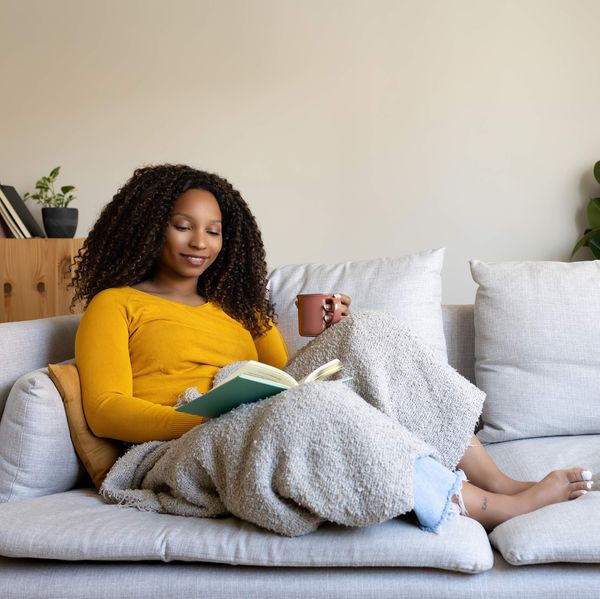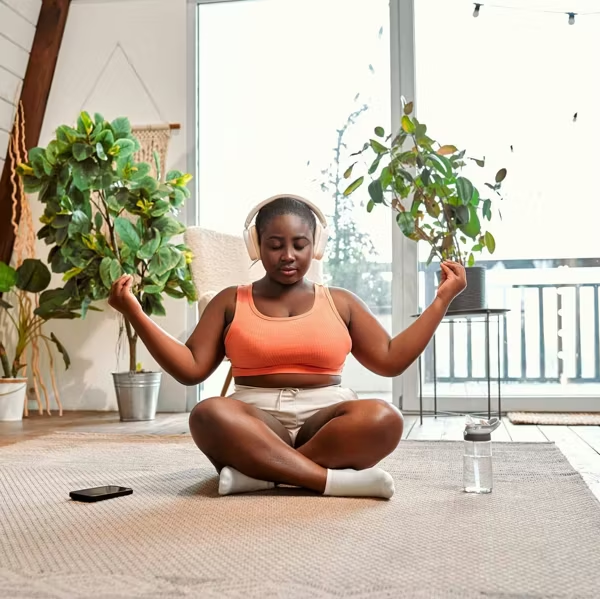As you’re in the process of figuring out what you want 2025 to look like, question: have you stopped to consider what your sleep habits should be? It’s kind of wild that although one in three people in this country say that they don’t get enough rest, and even though science continues to tell us that sleep rejuvenates us and even increases our longevity, out of all of the things that we will talk ourselves into not properly prioritizing, getting 6-8 hours a night of zzz’s is oftentimes on the very top of the list.
Why Sleep Should Be a Top Priority in 2025
Now that we’re just moments away from being (whoa) 25 years into 2000, it’s time to change all of that. If you want to look younger, you need to get more sleep. Ready to improve your mental state? Get more sleep. Wish to have a stronger libido? Yep — you already know (check out “6 Fascinating Ways Sex And Sleep Definitely Go Hand In Hand”).
And what if the flesh is willing, but the know-how is weak? No problem. I’ve got 12 sleep practices that you can incorporate, one month at a time, that can have you leaving the upcoming year saying, “This year gave me some of the best rest that I’ve experienced in my entire life!” — which is something that your mind, body, and spirit will be eternally grateful for. Trust me.
12 Monthly Sleep Habits to Transform Your Rest
January: Get a Bedding Makeover

Unsplash
Aight, so if it’s been 2-3 years since you’ve treated yourself to some new sheets, it’s time to make that move. The main reason is that we shed somewhere around 30,000 dead skin cells an hour, which equates to about 600,000 a day, and no matter how much you wash those sheets of yours, they still have a shelf life on the hygiene and quality of fabric tips.
Plus, it’s a good idea to have some sheet variety too — a set of cotton ones, year-round, flannel for the cooler months (the warmer your bed is, the less you will have to rely on your HVAC to keep you warm), linen when it’s warmer and a polyester blend if you want some super soft sheets and yet you’re on a budget.
While you’re at it, it also can’t hurt to cop yourself a new comforter. Down comforters are always going to be your best bet because their breathability factor will keep you from overheating (although they are great at keeping you warm as well). Some other benefits include being eco-friendly, soft, and super durable.
February: Do Some Deep Breathing Techniques
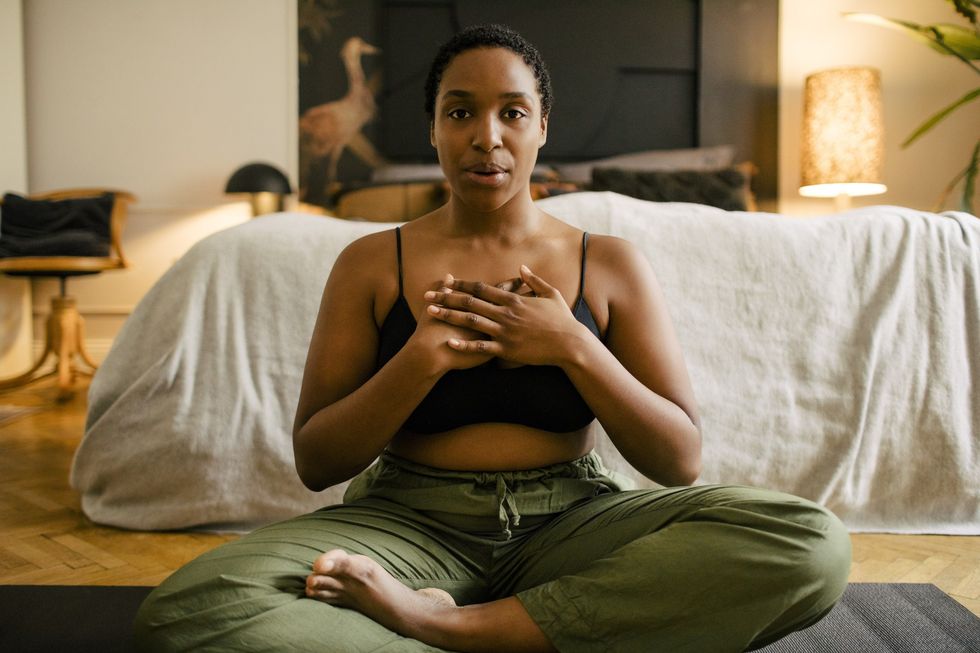
Getty Images
If you want to immediately reduce your stress levels after having a long, hard day, get into some deep breathing. By doing so, not only will you feel less anxious and more relaxed, but deep breathing has also been proven to put you into a better mood, lower your heart rate, and help you sleep so much better. As far as which deep breathing techniques are best, the 4-7-8 one is popular.
It consists of breathing in for four counts, holding your breath for seven counts, and then releasing the air for a count of eight, then rinsing and repeating several times. Some other techniques that are pretty effective include diaphragmatic breathing, box breathing, and the Papworth method. You can read about those (and more) here.
March: Incorporate 10 Minutes of Body Stretches Each Evening
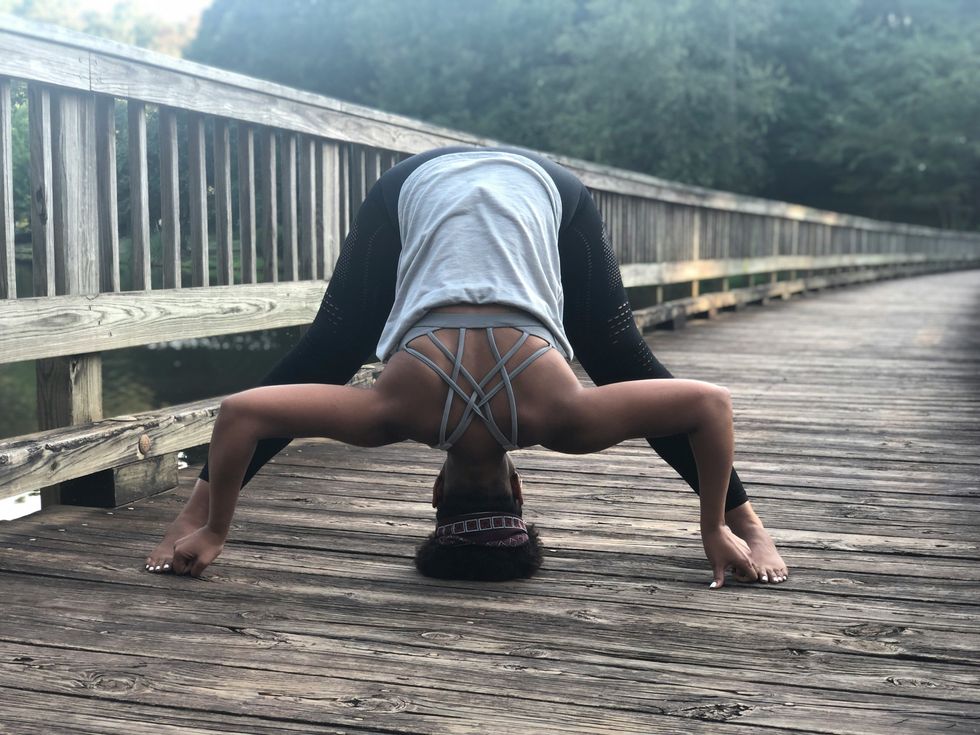
Unsplash
Something that I’m pretty sure not nearly enough of us do before bedtime is stretch our bodies. Stretching is highly beneficial because it helps to loosen your muscles, relax your body, and put your system in the state where it can better rejuvenate itself. Also, if you’re someone who works out and you want to avoid muscle spasms in the middle of the night (because ain’t nothin’ like a charley horse waking you up out of nowhere), stretching before sleeping can significantly decrease your chances of that happening as well. If you’d like to devote a bit of time to stretching out your body before catching some zzz’s, click here and here for some stretch recommendations.
April: Try This: Less Technology. More Reading.

Unsplash
With 57 percent of Americans admitting that they are addicted to their phones (check out “8 Solid Reasons To Put. Your Phone. Down.”) and 60 percent saying that they sleep with their phones — a month of phone detox at night can’t hurt nobody, especially if you suspect that your phone plays a role in you not sleeping as well as you should. Matter of fact, if you are feeling that way, science can back it. Between the blue light of your screen(s) jacking up your melatonin production to your screens overstimulating and distracting you, it’s no surprise that more people are getting less rest than ever, chile.
And what if you’re someone who needs to "settle" into sleeping? READ.
Research reveals that reading before bedtime helps to put your brain on a sleep schedule, relax your body, calm your mind, and, so long as it’s not content that gets your heart racing (like horror stories or thrillers), it can bring you holistic peace, too. Just make sure that you go with an old-fashioned page-turner and not an e-book. Y’all, electronic reads still produce the blue light that I was just talking about, and so, unless you’re gonna go the audiobook route, an e-book is basically…counterproductive.
May: Take a Magnesium, Calcium and Zinc Supplement
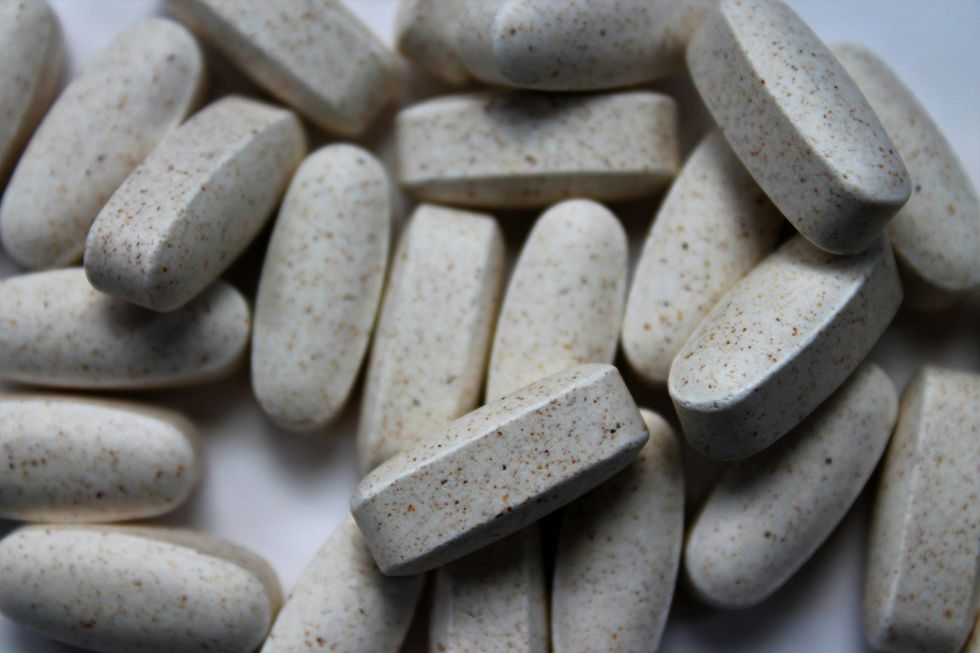
Getty Images
I don’t know how many times I have recommended taking a magnesium, calcium, and zinc supplement, but consider this to be another one. Specifically, when it comes to resting better, magnesium is good for you because it helps to relax your brain, nerves, and muscles, lower bodily inflammation, reduce PMS, decrease migraine discomfort, and regulate the neurotransmitters that are associated with sleeping.
Calcium is beneficial because it helps to prevent muscle contractions, helps your brain to use tryptophan and it can even help you to sleep straight through the night. And zinc? Zinc is a solid sleep agent because it helps to decrease inflammation, can aid in better regulating your sleep patterns, and improves your sleep quality overall. I’m telling you that I can personally attest to this because, on the nights when I take the supplement, my sleep experience is quite different than when I don’t.
June: Apply Cannabis Oil to Your Pressure Points
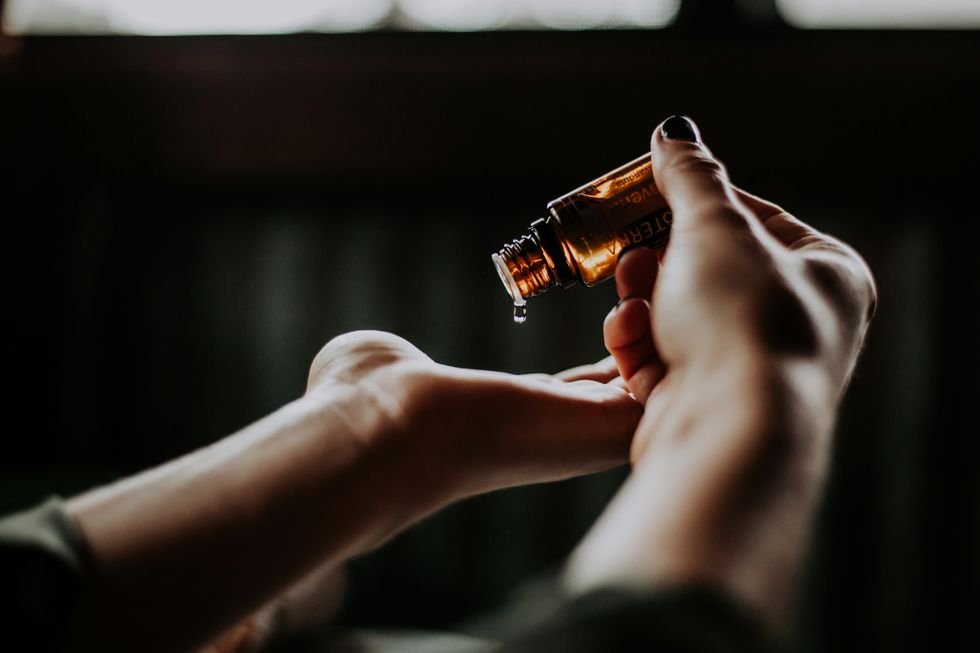
Unsplash
I doubt that it comes as any surprise that weed use is pretty popular during the month of June. And since Cannabidiol (CBD) can be used in a variety of ways, including smoking it, eating it (edibles), capsules, aerosols, and oils, I thought I would use June as the month to provide a pressure point sleep hack. The reality is that CBD is pretty beneficial if you’re someone who deals with insomnia as it directly relates to feelings of anxiety. Some studies also reveal that if you take in CBD with a lower amount of tetrahydrocannabinol (THC which is the ingredient in weed that makes you feel “high”), it can also improve the quality of sleep that you experience.
And so, since parts on your body — like right behind your ear, your ankles and feet, and your wrists — are all considered to be pressure points that can help you to fall asleep quicker whenever pressure is (gently) applied to them, why not rub some cannabis oil on them as you’re winding down? Seems like an ideal combo to me. (If you’d like to give it a shot, Healthline has a list of highly recommended CBD oils right here.)
July: Attempt Some De-Stress Journaling

Getty Images
If you’re not big on journaling and yet you do want to get more quality sleep in the new year, consider doing some stress journaling. It’s all about taking out some time to jot down the things that may be stressing you out. What purpose does that serve? Well, for one thing, “seeing” what’s going on in black and white can help you to organize your thoughts while writing your feelings about what’s going on can help you to feel validated — and that can reduce your anxiety levels so that you’re able to relax and sleep better.
Also, research indicates that if you make a point to share some “silver linings” or potential solutions to the cause of your stress, that can help calm and center you, which will make getting sound sleep a more realistic goal. Even writing for 10 minutes a night can accomplish all of this, by the way.
August: Play Some Nature Sounds

Unsplash
I’m the kind of person who prefers to sleep in silence — well, that is until I started to do more research into how ASMR (autonomous sensory meridian response), in the form of nature sounds, can do wonders…and they ain’t neva lied. Ever since I’ve been sleeping to rain sounds, I feel so much more rejuvenated when I wake up. From what I’ve read and researched, the reason why this sleep practice is so effective is nature sounds help to soothe our nervous system and reduce our natural inclination to take the “fight-or-flight” route.
Me personally, I really like listening to rain, thunderstorms or a winter blizzard although studies also say that the sounds of birds, running water or the rustling of leaves can significantly relax you too. YouTube has a ton of videos that run for hours, without commercials. Just go to the site and put the sound(s) that you’re after in the search engine. I’d be floored if you regret giving this tip a shot.
September: Implement “The Military Method”
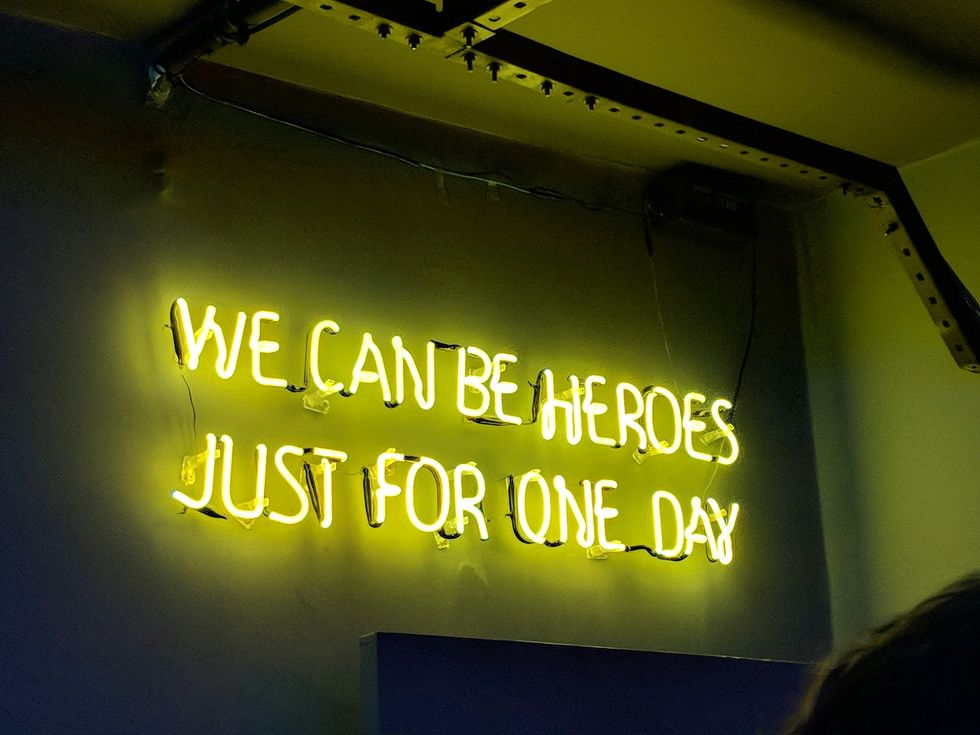
Unsplash
It actually wasn’t until I did some research for this article that I happened upon what is known as the military sleep method. If you’ve never heard of it before (either), it’s a type of breathing technique that claims that it can cause you to fall asleep in two minutes (I know, right?). Apparently, an Olympic sprint coach by the name of Lloyd “Bud” Winter came up with it, and its initial intention was to help military pilots get some shut-eye even in loud or dangerous environments.
Anyway, the method consists of things like deep breathing, muscle relaxation, and mind clearing — and hey, anything that can help you fall asleep in record time is worth at least trying out. You can learn more about how to try out the military sleep method by going here and here.
October: Sip on Honey Chamomile Lattes

Unsplash
Although technically, a latte is a coffee that has milk in it, teas with milk are considered to be their own form of a latte these days, too. That said, if you’re someone who likes to sip on something before turning in, the fall season is the ideal time for a honey chamomile latte. For one thing, chamomile has been proven to relax your system, in part, thanks to the antioxidant apigenin which provides a sedative-like effect. And the combo of milk and honey?
Since both milk and honey have tryptophan properties, and those properties help trigger the production of melatonin within your body, a warm cup of honey chamomile latte is a delicious way to lull yourself to sleep. (Just make sure that if you have a hard time falling back to sleep after a bathroom run, don't consume liquids three hours before bedtime.)
November: Experiment with Yoga (Sleep) Positions
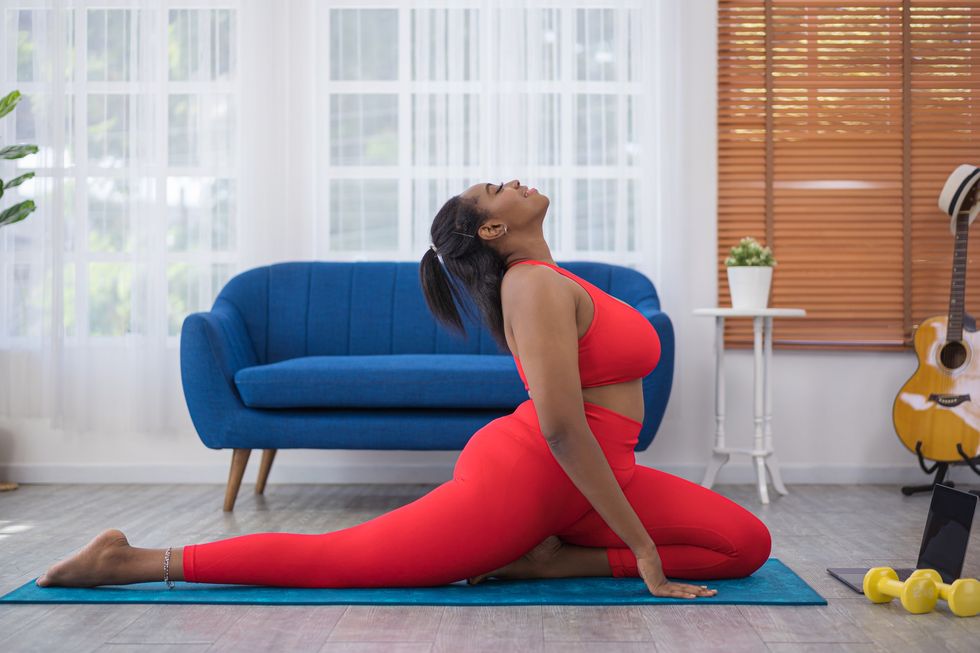
Getty Images
It’s been well documented that yoga can do everything from reduce stress and back pain to make you more flexible and yes, help you to sleep so much better. That’s why you might want to consider getting into a few yoga poses before getting in bed. The butterfly pose (sitting with the soles of your feet together and your knees spread as far apart as possible) can reduce tension, while putting your legs against the wall (why lying on your back) can increase blood circulation.
Oh, and speaking of poses that can help you to sleep better, studies show that sleeping on your left side can reduce snoring, keep acid reflux from being as much of an issue, and it can keep your blood pressure around where it needs to be as well. Some additional yoga poses for sleep can be found here.
December: Massage Yourself
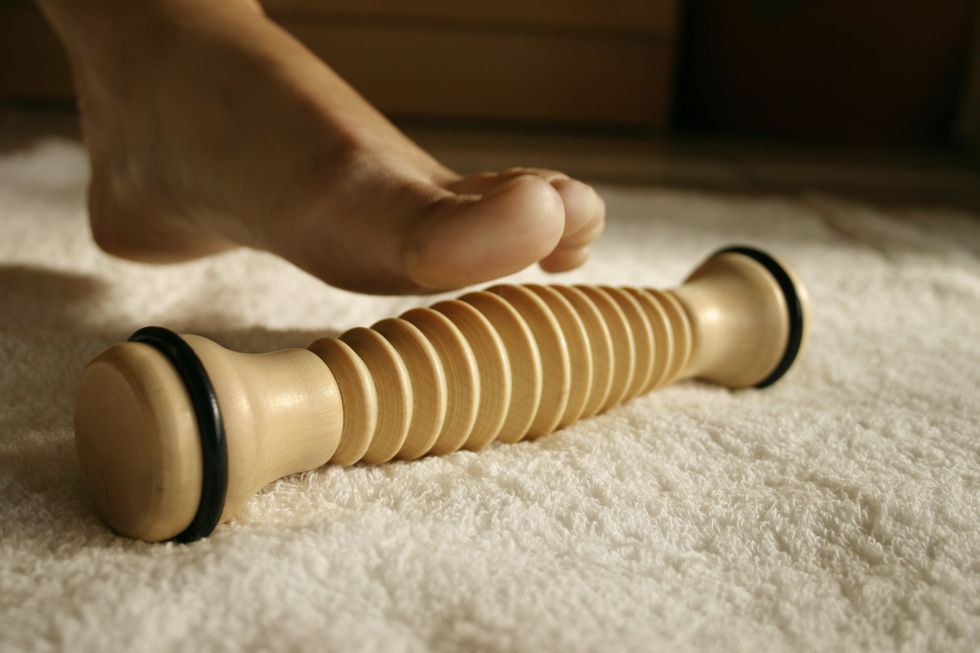
Getty Images
Professional massages are bomb (check out “12 Different Massage Types. How To Know Which Is Right For You”), there’s no doubt about that. However, if your budget is tight or you simply don’t have the time to book an appointment, that doesn’t mean that your body can’t reap the rewards — all you need to do is incorporate some self-massaging.
Yep, even rubbing on yourself will help ease stress and anxiety, bring relief to headaches, reduce muscle strain and tension, and increase blood circulation throughout your system. Tips for how to use a tennis ball to give yourself a massage can be found here. Tips for how to massage yourself with a foam roller can be found here. Tips for how to give yourself a facial massage can be found here.
____
Just like your body needs food, water, and air, it needs to rest. It can only serve you well to apply habits that will help you not just to sleep, but to sleep soundly and completely. Here’s to a year of all of that, sis. Indeed.
Let’s make things inbox official! Sign up for the xoNecole newsletter for love, wellness, career, and exclusive content delivered straight to your inbox.
Featured image by Aja Koska/Getty Images




